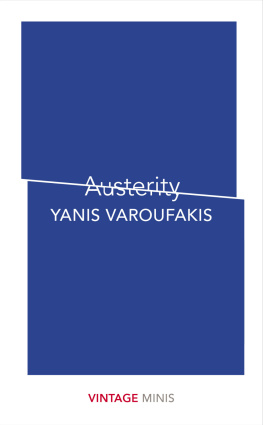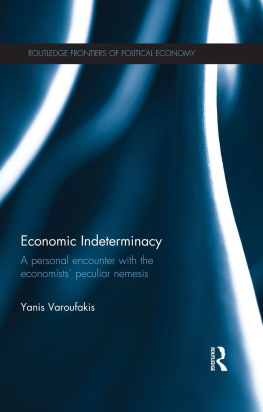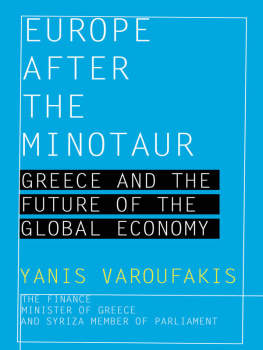Yanis Varoufakis - Austerity
Here you can read online Yanis Varoufakis - Austerity full text of the book (entire story) in english for free. Download pdf and epub, get meaning, cover and reviews about this ebook. year: 2018, publisher: Random House, genre: Romance novel. Description of the work, (preface) as well as reviews are available. Best literature library LitArk.com created for fans of good reading and offers a wide selection of genres:
Romance novel
Science fiction
Adventure
Detective
Science
History
Home and family
Prose
Art
Politics
Computer
Non-fiction
Religion
Business
Children
Humor
Choose a favorite category and find really read worthwhile books. Enjoy immersion in the world of imagination, feel the emotions of the characters or learn something new for yourself, make an fascinating discovery.
- Book:Austerity
- Author:
- Publisher:Random House
- Genre:
- Year:2018
- Rating:5 / 5
- Favourites:Add to favourites
- Your mark:
- 100
- 1
- 2
- 3
- 4
- 5
Austerity: summary, description and annotation
We offer to read an annotation, description, summary or preface (depends on what the author of the book "Austerity" wrote himself). If you haven't found the necessary information about the book — write in the comments, we will try to find it.
Austerity — read online for free the complete book (whole text) full work
Below is the text of the book, divided by pages. System saving the place of the last page read, allows you to conveniently read the book "Austerity" online for free, without having to search again every time where you left off. Put a bookmark, and you can go to the page where you finished reading at any time.
Font size:
Interval:
Bookmark:

And The Weak Suffer What They Must?
Adults In the Room
Talking to My Daughter About the Economy
. It is fun to look at what a fully fledged austerity drive would have done to Britains economy. Around 2010 the UKs public debt came to almost 80 per cent, or four-fifths, of national income. At the same time the UK governments total expenditure was about half of national income. Now, suppose Chancellor Osborne had given his pro-austerity instincts free rein and gone into a frenzy, slashing government spending by half, a cutback equal to a quarter of national income. Cutting this much government spending would reduce national income by at least a fifth. Suddenly public debt would go from four-fifths to four-quarters, or 100 per cent, of national income, without even counting all the public money that had to be given to the Citys bankers. This is why austerity, in times of private-sector consolidation, fails by its own criteria the consolidation of public debt.
. Indeed the numbers are telling. During his first two years in the Treasury (201012) Osborne actually increased government expenditure by 6.9 per cent. In this sense no actual austerity was practised by the CameronOsborne government at all. Austerity was utilized by them as a cover for a substantial redistribution of spending and tax cuts that favoured the rich and disadvantaged the poor. In simple terms, the top 20 per cent benefited greatly while the bottom 20 per cent suffered even more.
. This is banker-speak for securing an interest rate somewhat above the banks own borrowing rate and, hopefully, above interest rates charged to the banks average client.
. After the 2008 financial sector implosion, the banks with the most risk managers ended up in the deepest of black holes. The Royal Bank of Scotland, to give one example, employed four thousand risk managers and ended up needing a 50 billion bailout from the British taxpayer.
. During 19982007 interest rates fell everywhere as credit was turbocharged by the shenanigans of the Wests financiers. However, Germanys increasing trade surplus in relation to Europes south and the resulting flow of money to Germany meant that the price of money (the rate of interest) in Germany was always lower than in Southern Europe.
. The greater the supply of loans to a debtor like the Greek state, the lower the interest rate the bank had to charge to convince the debtor to take on even more loans. Thus the difference, or spread, between the interest rates paid by the Greek and the German governments shrank, giving even more incentive to the bankers to lend even more money to such debtors.
. One way to help a stressed debtor is to reduce the interest rate charged or to prolong the repayment period without charging additional interest. Such interest rate relief naturally reduces the value that the creditor will recoup.
. If I write on a piece of paper I, Yanis Varoufakis, confirm that I shall pay the bearer of this piece of paper a sum of X euros by such-and-such a date. This piece of paper is freely transferable to the extent that I am considered creditworthy, such an IOU has market value and could be sold by a bearer who prefers a sum less than X now than to wait until the specified date to collect X euros.
. And when these IOUs expired, the whole process was repeated, with the banks issuing new IOUs that the government guaranteed again so they could be swapped with the IOUs about to expire.
. The only difference between us was that I was not sufficiently motivated to keep quiet about it. But thats another story.
. Peter Hartz, who designed these reforms, was Volkswagens personnel director. There is a nice irony here in view of Volkswagens implication in the major emissions scandal, which has cast a long shadow over German manufacturing.
. Mini-jobs restricted workers to sixteen hours per week, at a standard monthly salary of 400 to 450 euros.
. Poorer Greeks money wages and pensions were increasing by something like 3.5 per cent, a large rise by European standards of the time, and the official inflation rate, they were told, was only 3 per cent. So their purchasing power must have been rising too. But it was not. The reason is that the inflation rate for poorer Greeks was much higher, around 9 per cent, but inflation for richer Greeks was negative. Negative? Yes. If you had a mortgage on a mansion in Athenss northern suburbs, the large drop in interest rates caused by the practices of my fellow-traveller Franz and his colleagues meant that your living costs fell! So, during the first few years of the euro, the good times, the Greek grasshoppers were prospering while the ants struggled. By 2010 the grasshoppers had taken their loot out of the country without paying their taxes, and it was the ants who were called upon to bail out the bankrupt state and the bankrupt banks through pension cuts, wage cuts, cuts in their health services, etc.
. Unnecessarily. A recession that Europeans did not have to have. Allowing Greece to default and restoring German and French banks to health the way that the Swedes and the Finns had done in 1992 would have avoided this recession.
. Data made available by the Bank of International Settlements.
. The IMF had already developed the reputation of a ruthless bailiff, following the Third World debt crisis, the Latin American crisis and the South East Asian crisis. Ironically, at a time, in 2010, when its managing director, the infamous Dominique Strauss-Kahn, was trying to soften the IMFs image, Chancellor Merkel insisted it should be part of the troika. She needed it in order to convince her own members of parliament that the bailouts austerity conditions would be brutally imposed. Thus the IMFs makeover failed as it became embroiled in another sequence of rescues that forced the weak to suffer that which they did not deserve.
. Which was of course necessary given that the first bailout was always going to fail, being nothing more than the original Ponzi austerity scheme.
. In the end Syriza did not win that election but came in a strong second. Its victory eventually came on 25 January 2015 in an election that I contested successfully and which resulted in my becoming Greeces minister of finance.
. Seeing that the ECB was buying Greek bonds, the theory went, investors might have been encouraged to do so too.
. This ploy might have worked except that M. Trichet, in a move of baffling folly, pre-announced the amount the ECB would spend on these purchases to counter the speculators. It was an open invitation to speculators to make money, as long as they could spend more money than the ECB was willing to. In Wild West terms, it was the equivalent of Clint Eastwood rolling up to the site of the showdown announcing to his opponent how many bullets he had left in his revolver. Then again, there is a simpler explanation as to why M. Trichet and the ECB did this: they only cared about making the French and German banks whole (by buying for them at full price the Greek government bonds whose value had crashed), with the story about striving to keep Greece in the money markets being only a poor excuse.
. In the first Greek bailout, in May 2010, Europes ridiculously hard line towards Greece was no to a haircut, no to debt relief, yes to a huge loan (110 billion) with high interest rates. The only beneficiaries were of course the beneficiaries that the bailout had been designed to benefit: French and German banks. Once their losses were averted, Brussels and Frankfurt began to plan for the inevitable haircut, which would hit small Greek bondholders and tragically the Greek pension funds whose charters obliged them to hold their capital in Greek government bonds. So a second bailout, which included a haircut for the weak, was ratified fully by the spring of 2012. To contain the skyrocketing debt, bonds held in private hands were haircut substantially and twice once in the spring of 2012 and once again in December 2012 that time under the guise of a debt buyback. In short, in 2012 Greeces private debt was cut in real value terms by 85 per cent. Except that the bankers and the ECB, which under Trichet had purchased more than 50 billion of Greeces public debt, were fully protected. The Greek state borrowed another 130 billion from which to infuse 50 billion into Greek banks and up to another 50 billion to pay back the ECB, which behaved like a hedge fund holdout. The only victims of the haircut were the small holders of Greek debt and pensioners, whose pension funds were effectively robbed of their capital base.
Font size:
Interval:
Bookmark:
Similar books «Austerity»
Look at similar books to Austerity. We have selected literature similar in name and meaning in the hope of providing readers with more options to find new, interesting, not yet read works.
Discussion, reviews of the book Austerity and just readers' own opinions. Leave your comments, write what you think about the work, its meaning or the main characters. Specify what exactly you liked and what you didn't like, and why you think so.













